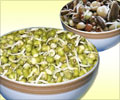A small, preliminary study has shown that eating just half a serving of soya a day can drastically reduce the sperm count in men.
A small, preliminary study has shown that eating just half a serving of soya a day can drastically reduce the sperm count in men.
Dr. Jorge Chavarro of the Harvard School of Public Health in Boston, Massachusetts, US, has revealed that soya foods contain high amounts of isoflavones, compounds that mimic the effects of oestrogen in the body. He says that such oestrogen-like compounds can have a dramatic impact on the male body.The researcher also referred to previous studies in mice that suggested that high intake of soya products could reduce male fertility.
In the present study, Dr. Chavarro and his colleagues identified 100 couples seeking treatment for infertility. They collected semen samples from the men, and asked them to complete a questionnaire about their intake of 15 soya-based foods such as miso soup, "power bars", and tofu over the preceding three months.
The analysis of the data thus collected showed that men who consumed half a serving of soya-based food each day had 65 million sperm per millilitre on average, 40 per cent less than the typical sperm count of men who do not eat such foods, which normally ranges between 80 million to 120 million sperm per millilitre.
Dr. Chavarro revealed that men with counts lower than 20 million sperm per millilitre were generally considered infertile. While presenting the new findings at the annual meeting of the American Society for Reproductive Medicine, he speculated that isoflavones from soya products might lower sperm count by interfering with other hormonal signals that drive sperm production in the testes.
He said that larger studies were needed to determine whether the drop in sperm count seen in men who consumed soya foods could translate into reduced fertility. Meanwhile, toxicologist Stephen Barnes of the University of Alabama at Birmingham has said that earlier studies involving men and primates with carefully controlled isoflavone intake had not observed an effect on sperm.
Soya industry representatives also feel that since isoflavone content in a given food can vary widely based on harvesting conditions, it is difficult to draw conclusions about the impact of soya from retrospective surveys of food consumption. "Unless researchers are measuring the actual isoflavone content it would be difficult to know the impact of soya foods on sperm count. When you do an observational trial like this there could have been other behaviours causing this decline in sperm count," says Nancy Chapman, executive director of the Soyfoods Association of North America based in Washington, DC.
He believes that the oestrogen-mimicking isoflavones in soya may push the hormonal levels in overweight and obese men even higher, to the point at which sperm begin to suffer.
Source-ANI
LIN/V
 MEDINDIA
MEDINDIA
 Email
Email






